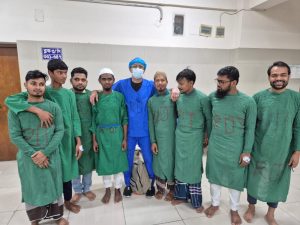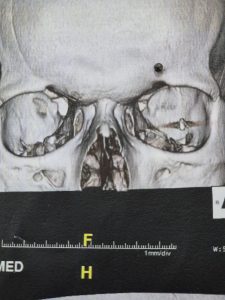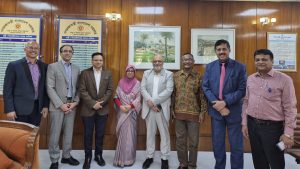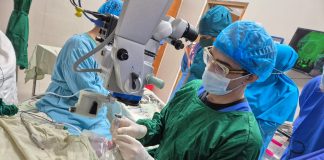Two leading Moorfields Eye Hospital surgeons have performed sight-saving operations on 24 young Bangladeshi protestors who sustained gunshot injuries during pro-democracy demonstrations last summer.

Consultant ophthalmologists Mr Mahi Muqit and Mr Niaz Islam were invited to Dhaka by the country’s interim Ministry of Health to examine and treat 120 patients, many of them students, who had suffered ocular trauma during mass protests against the previous government in July and August 2024.
The peaceful anti-discrimination protests turned violent, with security forces accused of using disproportionate force. Over 1,000 protestors suffered injuries to the eye, with 700 receiving emergency care from local medics. Many had bullets or fragments still lodged in their eyes.
Of those, 24 patients, aged between 14 and 30 underwent complex vitreoretinal surgery conducted over just two days by the British team, working in collaboration with doctors at the National Institute of Ophthalmology and Hospital (NIOH).
“Bullets still inside their eyes”

One of the patients, 20-year-old Minhaj, had been living with bullets embedded in his eye since last July. Surgeons were able to safely remove them and repair a retinal detachment in a painstaking operation.
Another young man, Rohan, had been shot in both eyes by police while walking with friends. One eye was beyond repair, but doctors successfully operated on the other. “He’s already smiling because his vision is improving,” said Mr Muqit. “We expect it to continue improving over the coming weeks.”
Similarly, Romel, blinded during the unrest, underwent successful surgery and was told he could also expect gradual vision restoration.
A mission of healing and legacy
The humanitarian mission, conducted on 8 and 9 March, was not only about surgery. The Moorfields specialists also provided training to local eye surgeons and delivered a clinical debrief to senior health officials from the interim government.
Mr Muqit, a senior vitreoretinal consultant with over a decade of experience working with Bangladeshi retina teams, said:
“It was an honour to be invited to help these young people, many of whom had been living with sight loss for months. It was an intense but deeply meaningful experience.”
His colleague, Mr Islam, a leading medical retina specialist, added:
“Our hope is that the skills we shared will allow NIOH doctors to continue treating others affected by trauma. Our legacy must be sustainable care.”
Patients who did not qualify for surgery were given long-term rehabilitation plans agreed in partnership with local clinicians.

Healing in the shadow of conflict
The collaboration between Moorfields Eye Hospital and NIOH took place against a backdrop of political instability and human rights concerns. While international attention has focused on the democratic transition in Bangladesh, stories such as those of Minhaj, Rohan and Romel highlight the personal cost of political violence.
Mr Muqit performed surgery on all 24 patients over the two days, and recovery is expected to show results in the weeks ahead. Both doctors expressed their admiration for the resilience of the patients and the commitment of their colleagues in Dhaka.
As Bangladesh moves into a new chapter, the restored vision of these young men and women is a powerful metaphor for the country’s hopes for clarity, justice, and healing.




